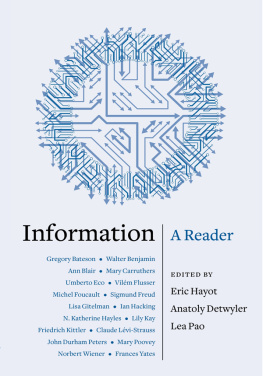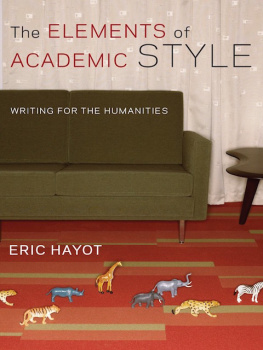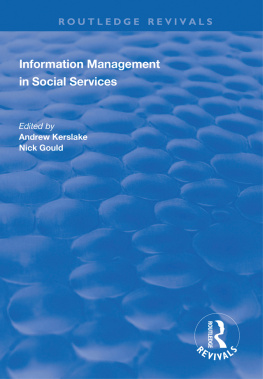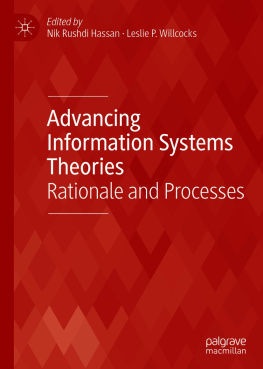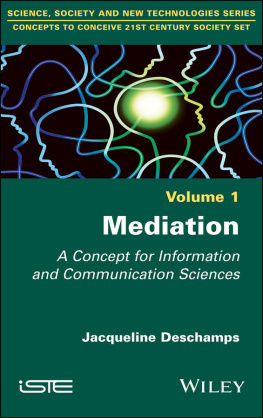Table of Contents
INFORMATION
INFORMATION
A Reader
EDITED BY
ERIC HAYOT,
ANATOLY DETWYLER,
LEA PAO
Columbia University Press
New York
Columbia University Press
Publishers Since 1893
New York Chichester, West Sussex
cup.columbia.edu
Copyright 2022 Columbia University Press
All rights reserved
EISBN 978-0-231-54654-6
Library of Congress Cataloging-in-Publication Data
Names: Hayot, Eric, 1972 editor. | Detwyler, Anatoly, editor. | Pao, Lea, editor.
Title: Information: a reader / edited by Eric Hayot, Anatoly Detwyler, Lea Pao.
Other titles: Information (Hayot, Detwyler, Pao)
Description: New York: Columbia University Press, [2021] | Includes index.
Identifiers: LCCN 2020030682 (print) | LCCN 2020030683 (ebook) |
ISBN 9780231186209 (hardcover; acid-free paper) | ISBN 9780231186216
(trade paperback; acid-free paper) | ISBN 9780231546546 (ebook)
Subjects: LCSH: Information sciencePhilosophy. | Information science
Social aspects.
Classification: LCC Z665 .I582 2021 (print) | LCC Z665 (ebook) |
DDC 020dc23
LC record available at https://lccn.loc.gov/2020030682
LC ebook record available at https://lccn.loc.gov/2020030683
A Columbia University Press E-book.
CUP would be pleased to hear about your reading experience with this e-book at .
Cover design: Milenda Nan Ok Lee
Cover art: sylverarts Vectors Shutterstock
CONTENTS
Eric Hayot
W e live, we are told, in an age of information. And though at first glance our sense of this new life with and as information seem to stem from a series of recent technological transformationsmost prominently the rise of electrical and digital methods of encoding, compression, storage, and networkinginformation as we now understand it has been the subject of human activity since the rise of oral culture over 10,000 years ago and probably before that as well. We know from analysis of the written works of Homer, for instance, that the poets who recited his work did not do so entirely from memory, but built their individual performances from algorithmic structures that allowed them to act flexibly and creatively within a larger pattern. We know too that the patterns of drumming used for long-distance communication across West African forests employed structures of redundancy designed to compensate for the relatively small throughput of their communication technology. And we know from the earliest written discussions of the value of writing that literacy was considered to have both potentially salutary and potentially damaging social, political, and personal effects, ranging from the stunting of the individual capacity for memory to the mimicry of authoritative knowledge. Hence Socratess worrying to Phaedrus, around 370 BCE, that writing might diminish the minds ability to hold things clearly before it; hence the great book-burning project of Qin Shi Huang, the first ruler of a unified Chinese empire, in the third century BCE.
Beginning from this transhistorical account of the social role played by information makes the concepts relation to the humanities fairly clear.
All that sounds great. So why does information and the humanities feel, nonetheless, like such an unlikely and uncomfortable pairing?
Because what this confident assertion of the relevance of the topic to the method ignores is, precisely, the role information currently plays in our social lives. One need only remember the many ways in which the contemporary meanings and uses of the word-concept information codifyor are felt to codify, same thingpositions and values about society, culture, meaning, and history that feel, for a variety of reasons, inimical to the basic assumptions of humanist thought to understand why the arrival of information on the shores of humanistic inquiry might make many humanists feel anxious. Facebook, Twitter, WeChat, Palantirtechnologies of corruption and control ranging from police use of facial recognition software to the corporate manipulation of media to the quantitative assessment of educational outcomes: information has already taken over everything else, and now it is coming for the humanities as well.
What are these ideas about information that seem somehow contrary to the very presumptions of the humanities? Lets make a list:
(1) That the information age in which we live is characterized specifically by a series of technological advances that produce a radical break with the pre-electrical/digital past, and that, whats more, that break must be resolutely understood as the result of progress. At its worst this position holds that all knowledge produced prior to the arrival of information is now obsolete.
(2) That the information society is, like information itself, politically and philosophically neutral, and that, therefore, its benefits and goods need not be understood as necessarily embedded withinand somehow connected tothe ugly histories of capitalism and imperialism alongside which the information society emerges, or to the various other modes of control and complicity that might cause one to be suspicious about such claims to neutrality.
(3) That this informational neutrality extends itself to matters of social representation, including matters of race, gender, and disability, and that therefore both the masculinity and the Whiteness of information as a concept and as a field of social practice have nothing to do with information per se, and are mere epiphenomena of other aspects of the social.
(4) That information has nothing, also, necessarily to do with the apparatuses of state or corporate control, even if the entire discipline of statistics, or the rise of data mining, or of communication and surveillance techniques now associated with Silicon Valley corporations or spy agencies have always been developed with the command and management of the social in mind.
(5) That information produces only social benefits, in terms of speed of communication and management, or in terms of organization and storage of social and institutional knowledge, and does notby, for instance, relying on the vast production of equivalences and the reduction of instances to patterns and trendstrample the specificity of individual people, historical contexts, or social groups, making them manageable and knowable in profoundly impoverished terms.
(6) That, in keeping with its general neutrality, information correctly describes the elements of a symbolic act (linguistic or otherwise) that remain fundamentally independent of their context, even ifas humanists keep trying to show everyone, with some limited successeverything has a context, and that there is therefore no such thing as information, in a strong ontological sense.
(7) That information-driven knowledge practices can and should replace the comparatively fuzzy, mealy-mouthed, ambiguous epistemologies of the traditional humanities, with their too-clever analysis of language, their imputation of impossible-to-disprove unconscious motivations, or their reliance on a variety of figures like catachresis, chiasmus, or paradox, figures that are simply figments of literary imagination, and that in fact this process is, happily, already well under way. Witness the rapid quantification of knowledge in the mixed disciplinespolitical science, sociology, psychology, and anthropologyover the last four decades, and the more recent uses of computational methods in fields like history (cliometrics) or literature (the digital humanities), all of which will finally put paid to the humanities and their vague, language-dependent bullshit.

